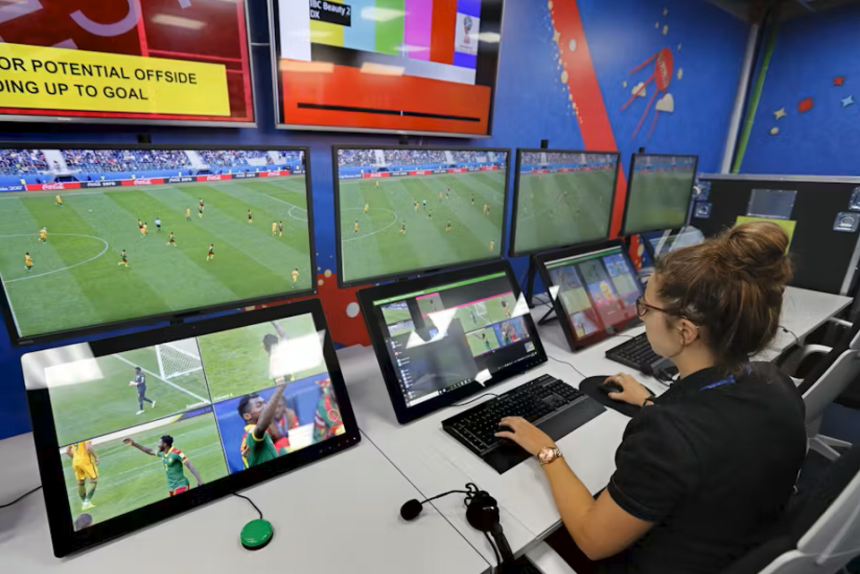The English Premier League (EPL), long celebrated for its high-paced drama and global fanbase, has increasingly turned to technology to reduce controversy and enhance fairness. Once dependent solely on human judgment, football now leans on advanced systems to complement referees and shape critical match decisions.
From goal-line cameras to semi-automated offsides, the integration of technology is no longer an experiment—it is a permanent fixture, transforming how the game is played, watched, and debated.
VAR: The Game’s Biggest Talking Point
The introduction of the Video Assistant Referee (VAR) in the EPL marked a seismic shift. Designed to review key match-changing incidents such as goals, penalties, red cards, and mistaken identity, VAR has reduced obvious mistakes that once cost clubs valuable points.
Yet, it remains divisive. Supporters argue it improves fairness, while critics say it disrupts the natural flow of the game. Lengthy reviews, delayed celebrations, and debates over “clear and obvious errors” continue to test its credibility. Still, the EPL maintains that VAR is vital to ensuring more accurate officiating in an increasingly competitive environment.
Goal-Line Technology: No More Ghost Goals
Few innovations have enjoyed as much universal acceptance as goal-line technology. Using high-speed cameras around the pitch, the system instantly signals the referee’s watch when the entire ball has crossed the line.
This technology eliminated one of football’s most notorious grey areas—goals that were wrongly disallowed or allowed. While an isolated failure occurred during Aston Villa’s clash with Sheffield United in 2020, the system has otherwise maintained its reputation as a trusted, impartial arbiter.
Semi-Automated Offside: Precision at Speed
The latest addition to the EPL’s arsenal is semi-automated offside technology. Employing limb-tracking cameras and AI-powered analysis, the system provides referees with near-instant feedback on tight offside calls.
The goal is speed. Fans and players had grown frustrated by long waits during VAR reviews of offside decisions. With this technology, the EPL hopes to balance accuracy with a smoother viewing experience. Still, debates persist about whether even the most advanced sensors can capture the intent and spirit behind football’s offside rule.
Player Tracking and Wearable Sensors
Beyond officiating, technology has redefined how players train and perform. Clubs now equip athletes with GPS vests and biometric trackers to monitor distance covered, sprint speeds, heart rates, and physical load.
This data helps coaches optimize tactics, minimize injuries, and evaluate player readiness. Analysts argue that such tools are not only transforming elite football performance but also influencing grassroots coaching across the world. As data-driven football grows, questions arise over how much individuality is sacrificed in the pursuit of analytics-driven perfection.
Enhancing the Fan Experience
For fans, technology has elevated football beyond the ninety minutes on the pitch. Augmented reality (AR) graphics, multi-angle replays, and live statistics now dominate broadcasts. In stadiums, high-definition big screens and real-time updates keep supporters engaged, while global audiences enjoy a richer digital experience through streaming services.
Football is no longer just a spectacle—it has become an interactive, data-laden experience where fans can argue about possession percentages and expected goals (xG) as passionately as they debate penalty decisions.
Balancing Spirit and Science
While these technologies aim to preserve fairness, they also invite new controversies. Has VAR undermined the spontaneity of goal celebrations? Do sensors and AI risk over-sanitizing a sport built on unpredictability? Can the human referee still command respect in an era when machines dictate outcomes?
For the EPL, the challenge is not just adopting technology but integrating it in ways that protect football’s emotional core. The league must balance its commitment to accuracy with the very essence of the game—its flow, drama, and the humanity of imperfection.
Africa and the Global Ripple Effect
The EPL’s innovations extend far beyond England. Across Africa, where millions of fans follow the league religiously, the adoption of cutting-edge technology sets a standard for local competitions striving for credibility.
But this also raises concerns. If African leagues lack the financial muscle to deploy similar systems, disparities in fairness and global recognition may widen. While the EPL positions itself as a leader in sports innovation, its influence exposes the technological divide shaping global football.
Why it Matters
Technology is now inseparable from modern football. From microscopic offside calls to real-time analytics, the EPL has embraced a digital transformation that is changing how the world’s most popular sport is played and consumed.
The question is not whether football needs technology—it does. The real challenge lies in ensuring that progress doesn’t come at the cost of passion. For all its cameras, sensors, and algorithms, the heartbeat of football still belongs to the roar of the crowd and the unpredictability of the game.
Talking Points
Fans Are Becoming Data Consumers, Not Just Supporters. From expected goals (xG) to possession percentages, fans now debate stats with the same intensity as goals. But here’s the catch: the football experience is being engineered to feed data-driven platforms.
Broadcasters and tech companies benefit when fans obsess over analytics. Slowly, supporters are being reprogrammed from emotional spectators into data consumers, locked into a football “attention economy.”
African Football Risks Being Left Behind—Again. The EPL’s embrace of technology highlights how African leagues are starved of innovation. Imagine Nigerian or Kenyan referees working with VAR, or South African stadiums running semi-automated offsides. It could transform credibility and fan trust.
But without investment, Africa remains a consumer, not a contributor, to football’s tech revolution. It’s not just about refereeing—it’s about digital sovereignty. Will Africa always import football technology, or can it build its own solutions?
Is Football Still Football If Machines Decide? At its core, football has always been about human imperfection—bad calls, controversial moments, and heated debates in pubs and viewing centers.
Now, machines are sanitizing the game. But do fans really want perfection, or do they crave the chaos that made football magical in the first place? If algorithms decide offsides with robotic precision, is that really the sport we fell in love with?





